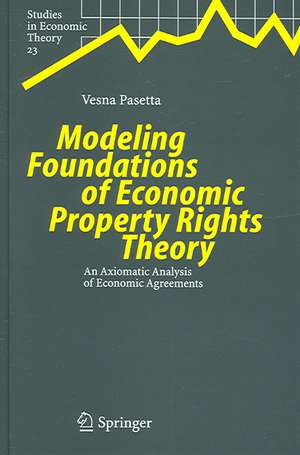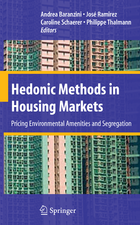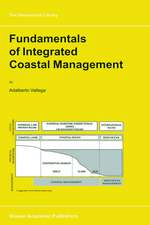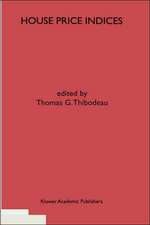Modeling Foundations of Economic Property Rights Theory: An Axiomatic Analysis of Economic Agreements: Studies in Economic Theory, cartea 23
Autor Vesna Pasettaen Limba Engleză Hardback – 6 iun 2005
| Toate formatele și edițiile | Preț | Express |
|---|---|---|
| Paperback (1) | 638.43 lei 6-8 săpt. | |
| Springer Berlin, Heidelberg – 21 oct 2010 | 638.43 lei 6-8 săpt. | |
| Hardback (1) | 644.82 lei 6-8 săpt. | |
| Springer Berlin, Heidelberg – 6 iun 2005 | 644.82 lei 6-8 săpt. |
Din seria Studies in Economic Theory
- 18%
 Preț: 958.07 lei
Preț: 958.07 lei -
 Preț: 394.71 lei
Preț: 394.71 lei - 18%
 Preț: 952.57 lei
Preț: 952.57 lei -
 Preț: 383.93 lei
Preț: 383.93 lei - 15%
 Preț: 640.37 lei
Preț: 640.37 lei - 15%
 Preț: 645.28 lei
Preț: 645.28 lei -
 Preț: 386.39 lei
Preț: 386.39 lei -
 Preț: 394.51 lei
Preț: 394.51 lei - 18%
 Preț: 1247.26 lei
Preț: 1247.26 lei - 18%
 Preț: 1241.10 lei
Preț: 1241.10 lei - 15%
 Preț: 643.99 lei
Preț: 643.99 lei - 15%
 Preț: 644.49 lei
Preț: 644.49 lei - 15%
 Preț: 643.34 lei
Preț: 643.34 lei - 15%
 Preț: 640.88 lei
Preț: 640.88 lei - 15%
 Preț: 645.79 lei
Preț: 645.79 lei - 18%
 Preț: 955.40 lei
Preț: 955.40 lei - 15%
 Preț: 643.00 lei
Preț: 643.00 lei - 18%
 Preț: 950.96 lei
Preț: 950.96 lei - 15%
 Preț: 636.30 lei
Preț: 636.30 lei - 18%
 Preț: 1022.48 lei
Preț: 1022.48 lei - 15%
 Preț: 648.05 lei
Preț: 648.05 lei - 15%
 Preț: 641.20 lei
Preț: 641.20 lei - 15%
 Preț: 652.64 lei
Preț: 652.64 lei -
 Preț: 402.17 lei
Preț: 402.17 lei - 18%
 Preț: 954.62 lei
Preț: 954.62 lei - 15%
 Preț: 639.41 lei
Preț: 639.41 lei - 18%
 Preț: 963.15 lei
Preț: 963.15 lei
Preț: 644.82 lei
Preț vechi: 758.60 lei
-15% Nou
Puncte Express: 967
Preț estimativ în valută:
123.39€ • 131.94$ • 102.88£
123.39€ • 131.94$ • 102.88£
Carte tipărită la comandă
Livrare economică 18 aprilie-02 mai
Preluare comenzi: 021 569.72.76
Specificații
ISBN-13: 9783540245520
ISBN-10: 3540245529
Pagini: 227
Ilustrații: XXIV, 232 p.
Dimensiuni: 155 x 235 x 22 mm
Greutate: 0.54 kg
Ediția:2005
Editura: Springer Berlin, Heidelberg
Colecția Springer
Seria Studies in Economic Theory
Locul publicării:Berlin, Heidelberg, Germany
ISBN-10: 3540245529
Pagini: 227
Ilustrații: XXIV, 232 p.
Dimensiuni: 155 x 235 x 22 mm
Greutate: 0.54 kg
Ediția:2005
Editura: Springer Berlin, Heidelberg
Colecția Springer
Seria Studies in Economic Theory
Locul publicării:Berlin, Heidelberg, Germany
Public țintă
ResearchCuprins
Economic Property Rights Dilemma: An Example.- Solution Concepts.- Policy Concepts of Appropriation.- Definition of Enterprises: Basic Elements of Formalization.- Arguments and coarguments.- E.p.r.s Gains and Welfare Structures.- Opening Structures: Simple Opening.- Dual Opening Structures.- Advanced Openings.- Quasiinsitutions.- Representation Theory: Clubs, Policies and Leadership.- Clubs with Transfers.- Duals and e.p.r.s Redistributions.- Reconstruction Theory: Reconstruction in Simple Institutions.- Reconstruction by Transfers.- Restructuring.
Recenzii
From the reviews:
"The monograph is an introduction to the foundations of economic property rights theory on a base of axiomatic analysis of economic agreements. The book offers a theoretical extension of mathematical economics, applying recent results of Hopf algebras, representation theory, theory of categories and deformation theories, in looking for suitable methodology of economic property rights theory and foundations of general theory of economic agreements. … The monograph is relevant for academics … ." (Sergei Georgievich Zhuravlev, Zentralblatt MATH, Vol. 1135 (13), 2008)
"The monograph is an introduction to the foundations of economic property rights theory on a base of axiomatic analysis of economic agreements. The book offers a theoretical extension of mathematical economics, applying recent results of Hopf algebras, representation theory, theory of categories and deformation theories, in looking for suitable methodology of economic property rights theory and foundations of general theory of economic agreements. … The monograph is relevant for academics … ." (Sergei Georgievich Zhuravlev, Zentralblatt MATH, Vol. 1135 (13), 2008)
Caracteristici
The book offers a unique comprehensive, technically in-depth, and up-to-date treatment of modeling economic agreements by applying recent results of advanced algebras, representation theory, theory of categories, and transmutation theory. Includes supplementary material: sn.pub/extras















